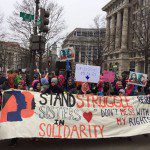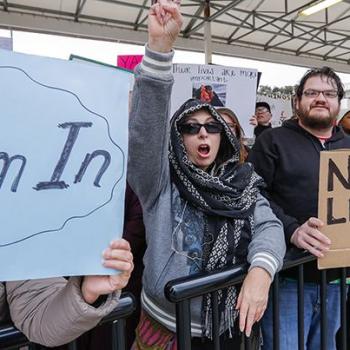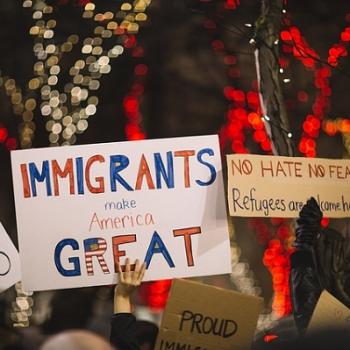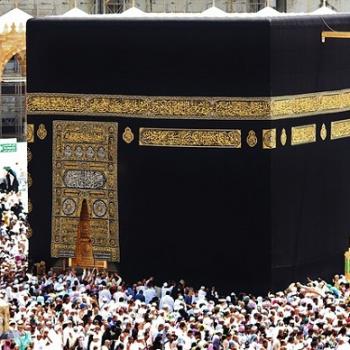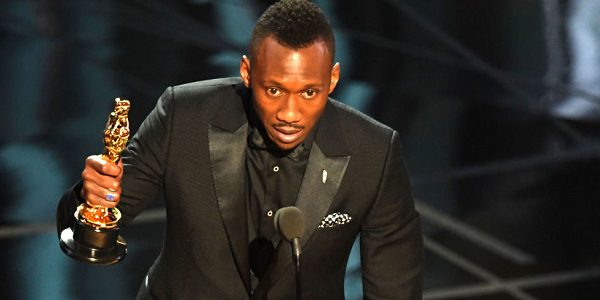
To save one life is to save all of humanity. – Quran, 5:32
Do we talk about Iranian director Asghari Farhadi’s winning his second Academy Award for his film, “The Salesman,” but boycotting the event because Iran is one of the seven countries targeted by President Donald Trump’s #MuslimBan?
Do we talk about how Khaled Khateeb, a 21-year-old cinematographer and Syrian national who filmed “The White Helmets” was denied entry to the U.S. to attend the 2017 Oscars because of aforementioned #MuslimBan? And how the film’s producer Joanna Natasegara read a statement by White Helmets founder Raed al-Saleh, which thanked the group for saving tens of thousands of lives in the six-years-and-counting Syrian war?
Or, do we talk about how Mahershala Ali, a Black Muslim (who identifies as an Ahmadiyya Muslim) won best supporting actor for his role in “Moonlight” (and I’m not even getting into the huge mistake at the end of the night when the Best Picture award was mistakenly given to “La La Land” and then immediately rectified and given to “Moonlight”)?
How about we talk about all of it? Because even though I rarely write on pop culture and entertainment, it’s kind of hard to ignore the significance of all that happened at Oscars 2017 in regards to Blacks, Black Muslims, intra-Muslim discussions and Muslims in general and the Trump administration’s Muslim (travel) ban.
The wins of Farhadi for “The Salesman” and the Netflix documentary short film “The White Helmets” was a perfect confluence of Hollywood, political activism and protest statements by absentia – some deliberate, some not. Farhadi could’ve (potentially) come to the U.S. for the awards show, but chose not to out of solidarity for his fellow Iranians who are being targeted by the #MuslimBan
Khateeb was denied entry because of the same ban. Both found ways to register their resistance against the ban by having statements read by proxy. And, in a move that puts the much-joked-about-phrase “creeping shariah” to shame by outright bringing Muslim scripture to mass audience, al-Saleh’s statement, read by Natasegara, invoked the words of the Quran in declaring:

“To save one life is to save all of humanity.”
Then there was the phenomenal win of Best Supporting Actor by Mahershala Ali, which lit up Muslims’ social media feeds for a variety of reasons. The first Oscar win by a Muslim was certainly a thing to celebrate. But that soon led to the inevitable intra-Muslim discussions about whether one could claim Ali as a Muslim, since is a follower of the Ahmadiyya sect.
(Click here to learn more about Ahmadiyya Muslims and their beliefs. Click here to learn why many Muslims consider Ahmadis to not be Muslim and how they have been persecuted.)
Pakistan’s envoy to the United Nations, Maleeha Lodhi, tweeted a congratulations message to Ali, only to quickly delete the tweet upon learning that Ali (a convert since 1999) was an Ahmadiyya. Ahmadis have been declared non-Muslims by Pakistani law and have been shamefully targeted, bombed and killed over the years.
Muslims want to claim Ali as their own, but many have been caught up in the “are Ahmadiyyas really Muslim” debate. What does that say about sectarian divides within the faith, and why some converts gravitate towards the Ahmadiyya sect?
Many Muslim activists and leaders posted about this debate, but what caught my eye was a Facebook update from American Muslim historian and former Patheos Muslim blogger Precious Rasheeda Muhammad, who wrote the following (which was originally excerpted from a speech she gave at Harvard University on April 11, 2015):
So, Let’s Talk about Sectarian Divides.
You have seen him here, in the Curious Case of Benjamin Button, here, in the Hunger Games, and here, in House of Cards, but have you seen Mahershalalhashbaz Ali here in this particular moment?
Picture him, in his greatest act, one of worship, in his greatest role, as a slave servant of God.
It’s nearly fifteen years ago. He’s a grad student at NYU. A Christian. And he is in tears, in a New York Mosque, an Ahmadiyya one.
“As I followed the motions of the brothers – standing, bowing, prostrating – I began to cry,” he later reveals. The tears are because this act of worship, even though he is not yet Muslim, speaks to him somehow.
Can you see him?
“At the time, I had no idea that there was a difference between Ahmadi Muslims and other sects. I just went to the Friday prayer,” he later confesses. The next week he finds himself in a Sunni mosque in Brooklyn. He still does not know the difference. But there he shares with a brother that he wants to be Muslim. In the Ahmadiyya mosque he found peace. In the Sunni mosque, he gave voice to that peace.
He accepts Islam during his final year at NYU, but remains confused about the differences between the Muslim communities. As his career takes him to Los Angeles, he begins to study with, in his words, “mainstream Sunni Muslims.”
“I assume they were Sunnis – again denominations were not as important to me then. I just wanted to learn and understand the faith and practice,” he later explains.
When at a Muslim convention, a brother interrupts Ali while he’s praying, to correct how the new Muslim has his hands positioned, Ali becomes upset.
“Well, why is this the correct way, what sect is right? I’ve seen people hold their hands different ways. Some even leave them at their sides,” Ali later shares, regarding his nervous response to the brother.
“The way I am showing you is correct” the brother had responded.
This really bothered Ali. It’s during this prayer struggle that Ali decides that his home is with the Ahmadiyya community, where he feels most confident about his path as a Muslim.
What happens when you see Muslims as part of this billion plus in the world and several million in America, the way Muslims describe their presence, but then when you want to be part of that existence, you find yourself pushed toward choosing a subset within that population, when all you wanted to do was to understand the faith and practice it?
Muslims say Islam is the fastest growing religion in the United States. Ali’s experience provides a window into difficult intra-Muslim relations challenges that potential, and new, American Muslim converts often face.
Ali himself hasn’t said much about this debate, focusing more so on the topic of persecution, as evidenced in his acceptance of a 2017 Screen Actors Guild Award for outstanding performance in a supporting role:
What I think I learned from working on Moonlight is you see what happens when you persecute people. They fold into themselves. What I was so thankful about in having the opportunity to play Juan was playing a gentleman who saw a young man folding into himself as a result of the persecution of his community, taking that opportunity to uplift him, and tell him that he mattered and that he was okay and accept him. And I hope that we do a better job of that. … My mother is an ordained minister. I’m a Muslim. She didn’t do back flips when I called to tell her that I converted 17 years ago. But I tell you now, we put things to the side, and I’m able to see her and she’s able to see me, we love each other, the love has grown.

